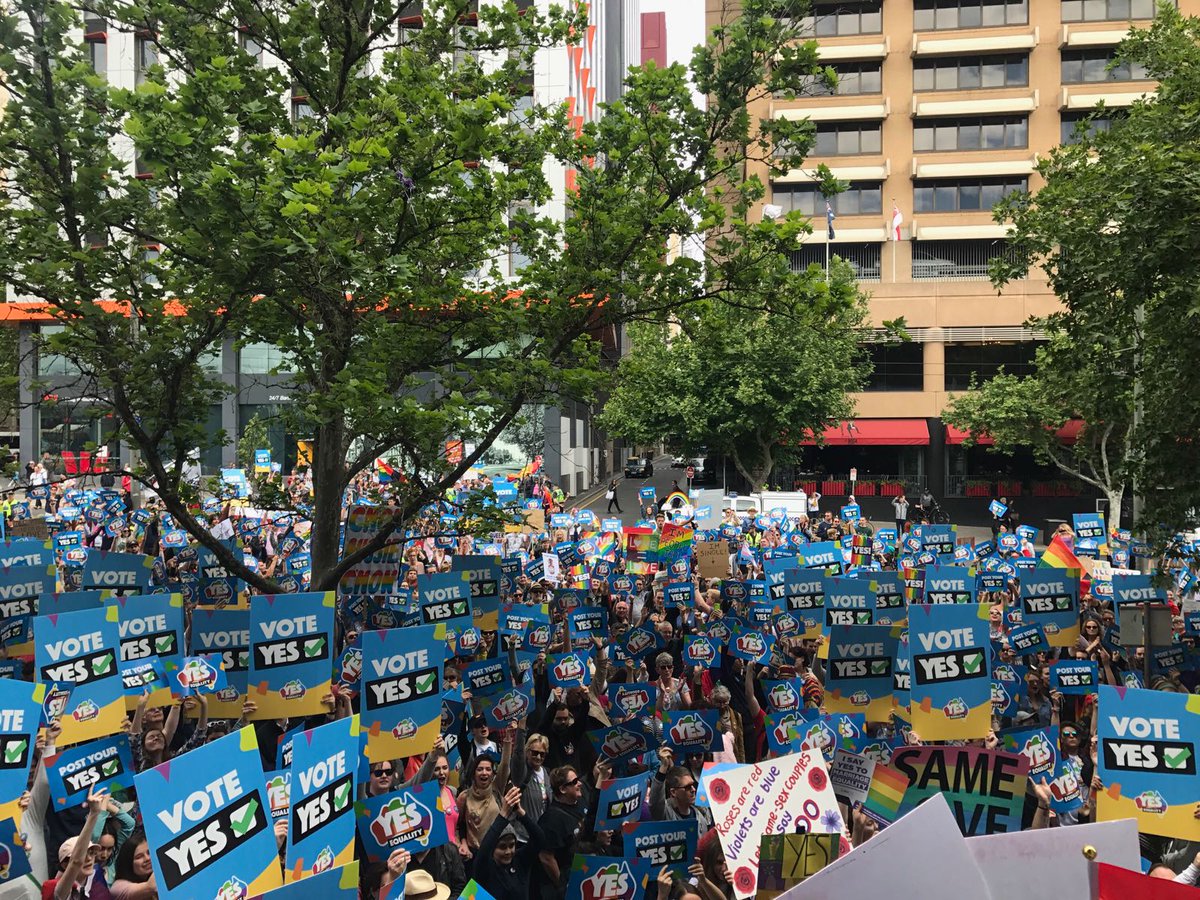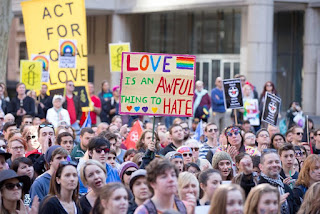Australia is currently engaged in a public debate that has the potential to be incredibly spiteful and harmful to our society. On one corner of the room, we have the people that believe that every individual should have the right to marry anyone they so choose. While on the opposite side, we have the people that are against this change and would like to maintain marriage as the union between a man and a woman. Media coverage has made it increasingly clear of the religious nature of the "no" campaign, despite this, the relationship between marriage and religion remains unclear to many and is being distorted by the media.
It has always been obvious that the most prominent opponents of marriage equality are people with conservative religious views, and it's even more obvious that very few arguments, if any, against marriage equality are based on religious beliefs. What we get instead are arguments based on "science", disguised in language to mimic real facts and science, but fail to pass scholarly review when looked at further. While these arguments easily fall apart under review, to the general public, they do enough to create doubt and uncertainty in the subject, enough to legitimise the "no" campaign on what is supposed to be a secular government.These arguments, for the most part, are used to further a theological and conservative agenda.
 |
| Tiernan Brady, director of the Equality Campaign. |
The Australian government is a secular institution, meaning religion does not have an influence or say(at least in theory) in any branch of government or its decisions, and as marriage is regulated by the state, religion should have no say as to whether or not people from the same sex get to be married. Religious marriage celebrants conduct weddings, however, they do so legally on behalf of the state, in the same way as secular celebrants conduct their ceremonies.
The Archbishop, Philip freier - Australia’s most senior anglican - when writing to Australian bishops in regards to the marriage plebiscite, stated that the church should embrace marriage equality if Australians choose to accept it. Freier’s argument is based on the fact that the church and the state already have differing stances on marriage, pointing out that the state already supports de-facto relationships, which are not allowed in the Church, furthermore to his point, we could add the differing stances on divorce and polygamy.
“We can still stand for and offer holy matrimony between a man and a woman as a sacred ordinance given by God, while accepting that the state has endorsed a wider view of marriage.”
So , why does religion play such a seemingly huge rule as the opposition to same sex marriage if the church itself seems to be largely in favour of marriage equality?
I believe there are two reasons for this;
First, this is another example of a loud minority creating the illusion that they are just as significant, in terms of numbers of supporters, as the majority. Conservative Politicians, right wingers in the Liberal Party, are doing everything they can in parliament to derail the vote, in addition, to the Australian Christian Lobby, that does everything it can to influence Australian politics with its religious agenda.
Second, the media has managed to inflate and distort religious representation in the “no” campaign -whether it is intentional or not, is a topic for another day- to make it seem as though both sides are closely matched in terms of support. The media’s need to appear as a ‘fair and balanced medium’ is the main cause for this problem, as well as the fact that a representative of the church like Freier, with moderate views, will never make as great of a headline as the more conservative and more extreme Australian Christian lobby, with its representation of old and wealthy mining billionaires- funnily enough, they do not represent any Christian Church.
 |
| There were multiple of these gatherings throughout the country, showing their support to the LGBT Community. |
A majority of Australians that associate themselves with some sort of religion are in support of same sex marriage, according to polling done by ‘vote compass’ in June of 2016.
The media has been complicit in allowing the conservative minority to go much further than it ever could in terms of denying gay people a right to marry someone they love, a basic human right. It has to do better, allowing this false balance to remain only serves to confuse the Australian people.
This argument has nothing to do with it being between a man and a woman, or the sanctity of marriage, this argument is to allow same sex people to have the right to marry their loved one, something that should be so obvious and so easy. The Australian Government is a secular body, marriage is not a religious institution, and religion is not opposed to marriage equality.
All this plebiscite has done is give a speakerphone to the loud dying minority that has negative views against the LGBT community and their rights as people.
We Must do better, as a society, as human beings.
Comments
Post a Comment